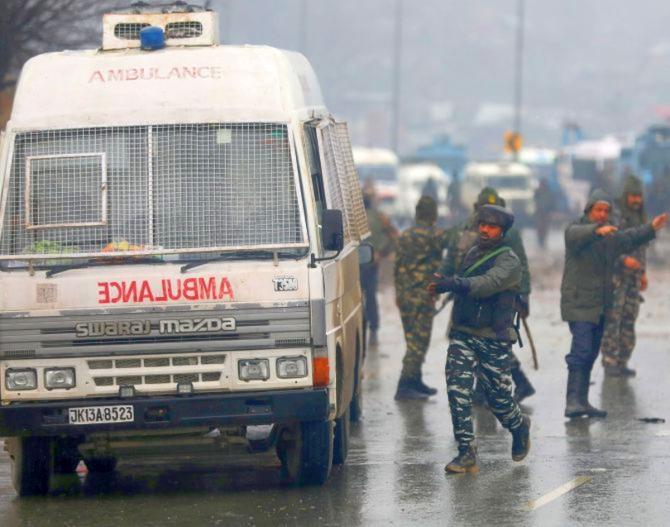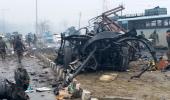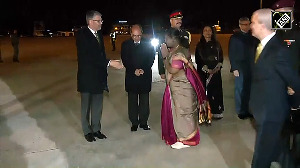'We know how to kill a terrorist, but we do not know how to stop an innocent boy getting radicalised.'

"There are so many vested interests in Kashmir which want young people to get radicalised... In Kashmiri society you go to the mosque or school and radicalisation is happening there," Rahul Pandita, journalist and author of the riveting new book The Lover Boy of Bahawalpur: How the Pulwama Case was Cracked, tells Syed Firdaus Ashraf/Rediff.com in the concluding part of the interview.
The saddest aspect of the book, I felt, was that it seems the terrorists are well-entrenched in Kashmiri Muslim society. They are welcomed as heroes and given this scenario. How does one get Kashmiris to hate these terrorists?
It is very unfortunate.
I wrote that in the book also.
KKashmir is a war which nobody is winning./p>
There is no way the Indian State is going to lose it and a handful people cannot defeat a strong country like India.
That is not going to happen.
Having said that, the Indian government is not a clear winner too.
You call it suspicion or mistrust in Kashmiris for New Delhi policies or whatever, but the fact is that there is a huge population in the majority community of Kashmiris who do not like the Indian State.
Is it because the majority cf Kashmiris are Muslims and they see India as a Hindu State?
It is a mix-up of a lot of things.
Many Muslims of Kashmir believe in the idea of Pakistan.
Others feel that they do not want to be part of a Hindu majority State.
Then there are people who have grievances.
Some people have been caught up in the vortex of the ongoing war in Kashmir.
You also have to look at the fact that a whole generation of young Kashmiris who were born in Kashmir after 1990 have only seen crackdowns and isible Indian State like Army soldiers, CRPF soldiers or the J&K police.
This is because of the schizophrenia created by successive governments in New Delhi.
They allowed soft separatism to prevail in the Valley.
The mainstream politicians of Kashmir sang one language in New Delhi and when they went back to Kashmir sang another language.
It created a schizophrenia in Kashmiri minds as they wondered whether they were a part of India or not, or where they should go.
This reflects in the attitude of younger Kashmiris.
There are so many vested interests in Kashmir which want these young people to get radicalised.
You go to a madrasa or school, you will get a teacher who is spewing venom against the Indian State.
You are taught terrible things as a young student and 99 per cent of them are lies against the Indian government.
Mudasar, one of the terrorists, is a cricket buff. His family alleges he was beaten up by policemen.
Can one such incident change the life of a young Kashmiri Muslim so drastically?
Not at all.
Mudasar was another boy who loved cricket.
You are in Mumbai and suddenly you are caught jumping a traffic light and the cop slaps you.
This happens at many places in Indian cities.
It is a daily occurrence in India.
This happened during corona times too when someone was not wearing a face mask and he was beaten up by the police.
That person cannot go and become a terrorist later, right?
What you are asking in the question is the spin that a terrorist's parents give later after their son is caught for terrorism to justify their son's act of terrorism.
They say he was on a motorcycle and he was slapped by the police so he took to the gun.
It does not work like that.
In Kashmiri society you go to the mosque or school and radicalisation is happening there.
You go and meet your uncle who is radicalised.
From the Indian side to counter that, we have a very slow process and don't know how to stop it.
There is no vision on how to counter this.
That is a change we need to bring in our counter-terrorism approach, if you want to sort out the Kashmir problem.
We know how to kill a terrorist, but we do not know how to stop an innocent boy getting radicalised.
Why was no punishment meted out for the intelligence failure on Pulwama?
Who is to be held accountable from the government side for the death of 40 CRPF jawans?
Some kind of accountability has to be there.
I have heard some crazy stories on social media which has become an echo chamber, that PM Modi's government deliberately ignored the Pulwama attack knowing very well that the attacks are going to happen.
These things are laughable.
People don't understand the difference between general intelligence and actionable intelligence.
For example, on every Republic Day and Independence Day, the Intelligence Bureau issues a general alert that militants may do something.
This is a very general intelligence and such kind of intelligence alerts are always there in Kashmir.
Every month such alerts are there in Kashmir, but that is not actionable intelligence.
Actionable intelligence would be that there are three people in a house and they are doing something, or when someone is buying ammonium nitrate or digital multimeters in large quantities -- actionable intelligence starts there.
When Umar Farooq comes from across the border and spends a lot of time at Narwal transport yard on the outskirts of Jammu, why does he not stand out?
There is no intelligence there and this is definitely an intelligence failure.
When someone like Aashiq Nengroo as a truck driver can make multiple tours from Kashmir to Jodhpur to Punjab and does not get caught, that is intelligence failure.
He brought 33 Jaish terrorists from the international border of Punjab and Jammu to Srinagar, which is definitely an intelligence failure.
At some point the Indian government will have to look into this.
Mehbooba Mufti had tweeted that the NIA failed to catch hold of Pulwama masterminds by shielding disgraced police officer Davinder Singh.
Davinder Singh is a symptom of a major problem.
In his case the investigation is still ongoing.
We do not know the entirety of that case.
We know that he is a cop who has gone rogue.
As an investigating journalist, I have to be sure to link him to the Pulwama attack and this book is specific to the Pulwama attack with a Jaish-e-Mohammed link and the rise of Jaish-e-Mohammed in J&K.
The question on Davinder Singh is important because he was transferred three months before the Pulwama attack from the same place where the attack took place. Your book misses that angle.
I am following the Davinder case and there is so much left to unfold.
Until that information does not unfold, I personally felt that the Davinder Singh case goes beyond the purview of what I was writing in the book.
Was scrapping Article 370 decided on the day of the Pulwama attack?
I don't know whether it was taken on the same day as abrogation of Article 370 was in the BJP manifesto for years.
Yes, but on the very same evening of the Pulwama terrorist attack, the Modi government took the decision to do an air strike on the Jaish-e-Mohammed base in Pakistan.
That resulted in the Balakot strike.
Whether the abrogation of Article 370 was decided the same evening or not I don't know, but the Pulwama attack definitely influenced and sealed the final decision of the abrogation of Article 370.
Why have you used the word 'Lover Boy' in the book's title?
I wanted to highlight the ruthlessness and manipulation of terrorist Umar Farooq.
He is highly trained.
He is trained in the best facility of al-Qaeda and Jaish-e-Mohammed.
The way he handles Adil Dar, the suicide bomber of Pulwama, the way he infiltrates and the way in such a short time he builds a tight network of people.
Moreover, he convinces Adil Dar to become a suicide bomber and gets his way with everything to cause damage to India.
In this process, he used a lot of methods -- one method was to romanticise this young gullible Kashmiri girl to fall in love with him.
She has fallen in love with a young mujahid whom she was equating with someone like Che Guevara.
He is not in love with her.
He just uses her because he needs shelter in a particular house.
He had multiple love affairs.
He was a master at it.
Insha Jaan, his main lover in Kashmir, has absolutely no idea that he was having multiple affairs.
That is what comes to shock to us too when the NIA tells Insha that Umar Farooq was dating multiple women in Kashmir.
He was cheating on her and was having an affair with Insha's cousin, too.
It is at that time she breaks down and tells them the entire story of what was happening in her house and what she was privy to.











 © 2025
© 2025